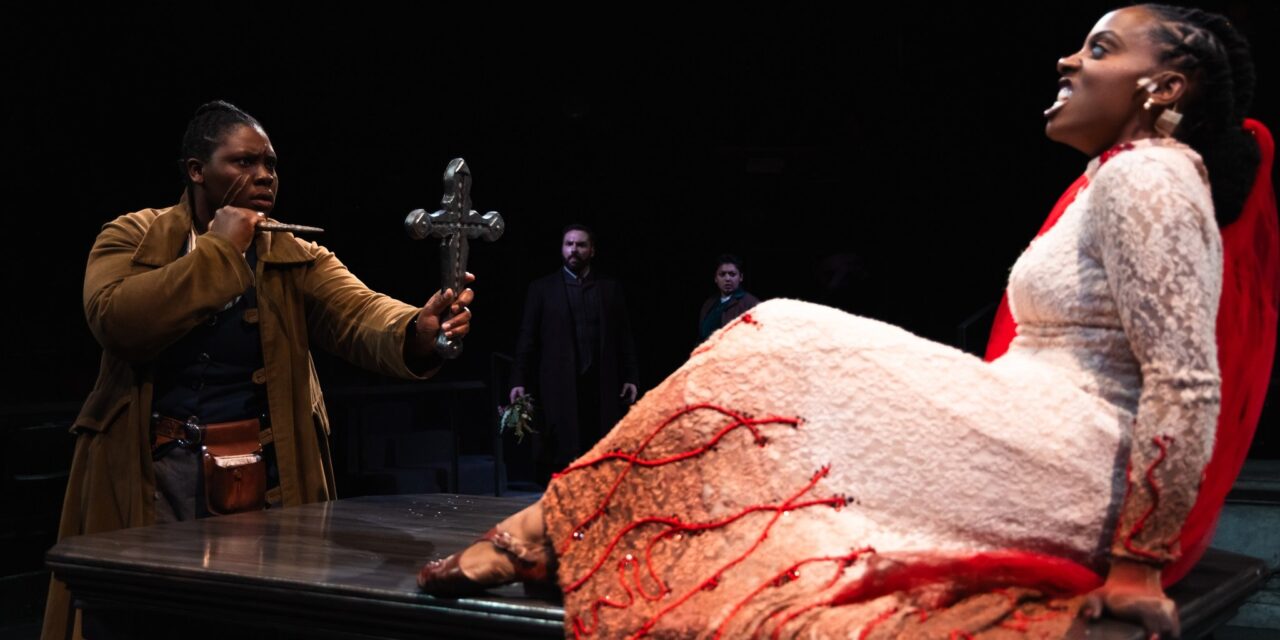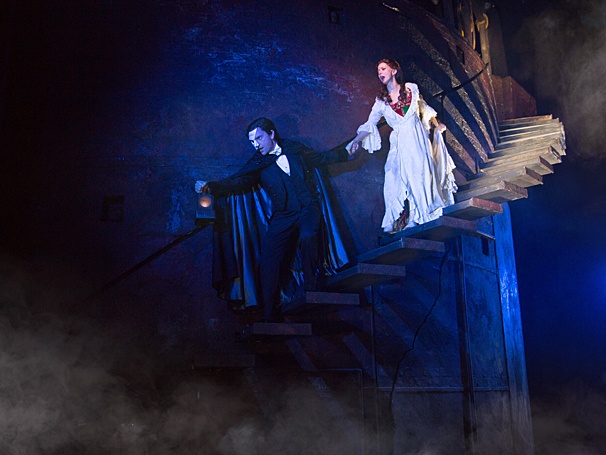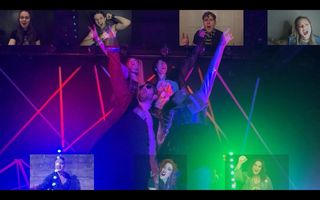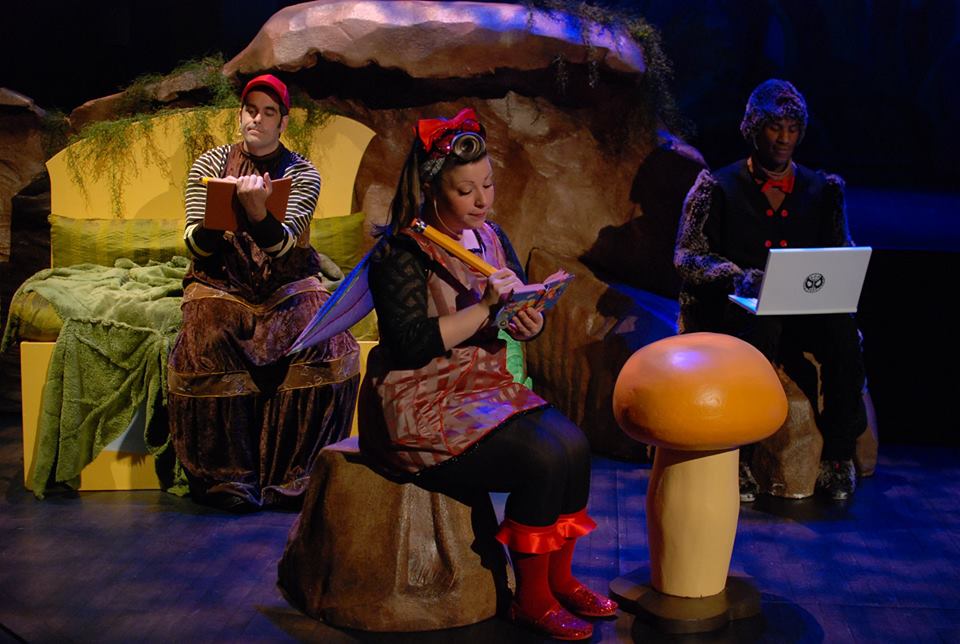LaShondra Hood & Brittany “BeeBee” Patillo in Dracula, A Feminist Revenge Fantasy. Photo: T.A Yero/Two Hearts Media
Dracula, A Feminist Revenge Fantasy
By Kate Hamill, based loosely on the novel by Bram Stoker
Directed by Jennifer Pennington
A review by Keith Waits
Entire contents are copyright © 2023 by Keith Waits, All rights reserved.
The return of Kate Hamill’s revisionist Dracula under the sure hand of director Jennifer Pennington and featuring the exact same cast from the first production one year ago is both welcome and a challenge. A challenge for the reviewer to find new and fresh observations to make on a show that is welcome because it was a fresh and innovative take on a story that had long been a venerable part of the Actors Theatre of Louisville season for multiple generations.
I won’t belabor the familiar plot, because playwright Kate Hamill does not abandon it so much as expose the depth of patriarchal domination at the heart of not just Count Dracula’s perceived focus on female seduction but the subjugation exercised by the mortal male characters. The tropes are there but overturned or turned inside out, so that the women become the hunters, gaining crucial agency instead of waiting to be victimized.
Of course, the biggest shift is changing Dr. Van Helsing from an aging European academic to a younger and energetic Black woman, brash and caustic not because she is Black but because she is…you know…hunting the undead, a profession that is not for the faint of heart. But make no mistake, Hamill’s choice here is not subtle but deeply relevant.
What I enjoyed more the second time around begins with the mischievous sense of play that characterizes the relationship between Mina and Lucy and how it reinforces the intimacy of female friendships. Mina is married to Jonathan Harker and pregnant with their first child, and he is depicted as caring and sensitive enough, although Lucy’s fiance, Dr. Seward is almost cartoonishly sexist and intent on subjugating women at every opportunity. The contrast is clear but it also seems as if neither man will ever achieve anything like the bond between Mina and Lucy.
More importantly, I thought more about Hamill’s corollary between Christian patriarchy and vampirism. The constant reference to Dracula as “Father” by Renfield and the two wives who serve him, Renfield updating the Lord’s Prayer to an unholy sacrament are just two instances of this, and while Dracula scholarship for over 100 years has long explored the presence of such ideas in Bram Stoker’s original text, Hamill throws them into high relief for theatre audiences who may come just for the thrills and chills.
But I was also thinking about the specter of Lucy declaring the freedom she feels having joined the ranks of the undead. Suddenly she is no longer obliged to play the game of courtship with the unctuous Seward and his smothering misogyny. Dracula was born in the Victorian period in England, and the most provocative notion may be that being in service to a vampire is preferable to the unyielding and abusive social customs of the time. Is Hamill amplifying this idea having discovered it in Stoker? I may be out on a limb here, but I think it points to the heady intellectual feminist underpinnings of Hamill’s take and I wondered if the secret allure of all such transformational horror is that we are invited to identify with possessed or undead characters.
Probably more to the point is that Lucy speaks in the language of victims of domestic violence that find it nearly impossible to not only break from their abuser but to stop defending them. That the Center for Women and Families had a table in the lobby is no small thing. There are still far too many monsters in the world, and they are rarely as clearly identifiable as a vampire from Transylvania.
On its surface, this production seems entirely faithful to last year’s staging. It allows the time for all of these ideas to sit with you but also tries and mostly succeeds in delivering the scary stuff. There is a good deal of playing straight to audience members – Abigail Bailey Maupin climbs all over the railing surrounding Renfield’s cell to rant only inches away from audience members (section 6 if you are choosing seats and that is your bag, but you will miss the highlight of Katelin Ashcraft’s set design) – and Nick Jordan’s Dracula leans into the front row many times. Whether that scares you or provokes laughter is appropriate either way. As gruesome as he is, Dracula always has a sense of humor.
As good as they were last year, the cast seems to be more relaxed and confident. I didn’t think LaShondra Hood could be more confident than she was in fall 2022, but she wears this Van Helsing like the long brown coat that is a feature of her costume, a natural, easy fit. As previously mentioned, Ms. Maupin has introduced an element of chimpanzee in how she clambers about the stage and onto the rails with energy and dexterity. I sat behind Renfield’s cell last year so I can’t be certain how much of that is new but it is certainly effective. And respect to Mark Mozingo for occupying the ugly expression of sexism and patriarchy that is Dr. Seward. How much you dislike him is testament to the quality of his performance.
Featuring Alanna Darby, LaShondra Hood, Justin Jackson, Nick Jordan, Abigail Bailey Maupin, Mark Mozingo, Brittany “BeeBee” Patillo, Lipica Shah, & Dara Jade Tiller
Dracula, A Feminist Revenge Fantasy
September 8-24, 2023
The Bingham Theater.
Actors Theatre of Louisville
315 West Main Street
Louisville, KY 40202
actorstheatre.org
Keith Waits is a native of Louisville who works at Louisville Visual Art during the days, including being the host of Artists Talk with LVA on WXOX 97.1 FM / ARTxFM.com, but spends most of his evenings indulging his taste for theatre, music and visual arts. His work has appeared in LEO Weekly, Pure Uncut Candy, TheatreLouisville, and Louisville Mojo. He is now Managing Editor for Arts-Louisville.com.





